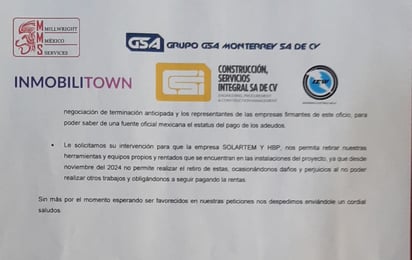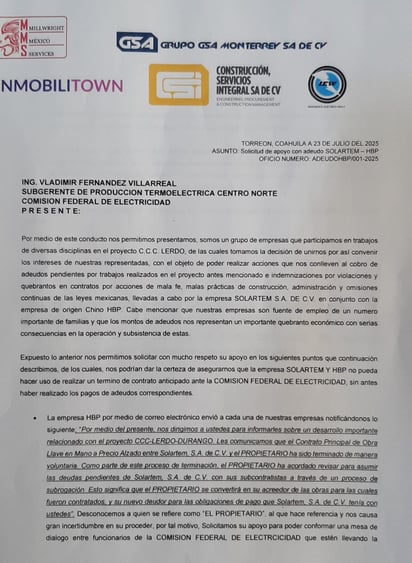$319 million combined cycle power plant in Lerdo left unfinished

Following the failure to meet several delivery deadlines by the Chinese company Oil HBP Science & Technology Corporation, in consortium with the Mexican company SOLARTEM SA. de CV., both companies contracted by the Mexican government to build the new Combined Cycle Power Plant (CCP) in Lerdo, Durango, the contract with both associated companies for the construction of this plant, whose main objective is to provide electricity to the north of the country, has finally been terminated. This CCC in Lerdo represents an investment of $319 million. To date, no one has been held accountable for the multimillion-dollar debts owed to Mexican subcontracted companies, with the CFE Trust Fund being the source of payment.
This plant is crucial for the northern region's electricity supply, as it would produce 350 MW across its three modules. An investment of $319 million was planned for this project, with the goal of providing electricity to the states of the Bajío and northern regions of the country. This would also reduce the power outages experienced in the Laguna region of Coahuila and Durango.
The Lerdo Combined Cycle Power Plant (CCC) is part of the combined cycle projects initiated during the six-year term of former President Andrés Manuel López Obrador. Its construction was scheduled for April 2022 and was supposed to be completed by August 2024, but there were delays. The Lerdo CCC was part of the presentation of the Federal Electricity Commission (CFE)'s 2025-2030 National Electric System Strengthening and Expansion Plan.
Even back in February of this year, during the People's Morning Conference, led by President Claudia Sheinbaum Pardo, CFE Director General Emilia Esther Calleja Alor announced that it would be inaugurated on June 30.
The federal official explained that this project, which began construction more than a year and a half ago, is part of the 2025-2030 National Electric System Strengthening and Expansion Plan, which includes 51 infrastructure projects with an estimated investment of $22.377 billion, aimed at increasing the capacity of Mexico's electrical system by 22,674 MW.
The ContractThis is a turnkey contract at a fixed price for the construction of a Combined Cycle Power Plant in the City of Lerdo, Durango, called CCC Lerdo, Located within the facilities of the Guadalupe Victoria Thermoelectric Plant (owned by CFE), between the Conventional Generation Projects Trust and the Chinese company HBP, in consortium with SOLARTEM.
The Conventional Generation Projects Trust is a trust created by the Federal Electricity Commission to finance thermoelectric power plant projects using combined cycle and internal combustion technologies, located in strategic areas with high electricity demand.
A lump-sum turnkey contract is an agreement in which a contractor agrees to deliver a complete and functional project in exchange for a fixed, pre-established price, typically assuming responsibility for all costs and risks associated with the project's execution.
At the outset of the contracts, the CFE declared that the source of payment would be the CFE Trust.
They Were Left BadThe Lerdo CCC project began construction activities on August 14, 2022, and its contractual term was August 15, 2024, which was not met by the company HBP, in consortium with SOLARTEM, who obtained an extension for February 28, 2025, which they did not comply with, and then obtained another extension for June 30 of this same year, which was also not met, also causing a serious problem for the country, which by these dates already had the availability of electrical energy that this CCC in Lerdo, Durango would produce.
Upon reaching the third delivery date, June 30 of this year, the project was closed and all subcontracted Mexican companies (to whom they owe millions of dollars) received an email from HBP, informing them that the contract had been voluntarily terminated between SOLARTEM and "the owner," and that the owner (CFE) had agreed to review and assume SOLARTEM's outstanding debts to its subcontractors.
This would be done through a subrogation process, meaning that CFE would become the creditor for the works for which they were contracted and the new debtor for the payment obligations that SOLARTEM had with these subcontracted Mexican companies (more than 20 companies).
To this end, they asked the Mexican subcontracted companies to complete an attached financial table, with requested information regarding unpaid invoiced amounts and the value of completed but uninvoiced work.
However, after the following days, all companies received calls where they were informed that they should review accounts with Chinese personnel from the companies SOLARTEM and HBP and that the position was to pay only 30% of the debt to these companies , although some of them managed to complete 100% of the work agreed under their contracts, but have not yet received the corresponding payments, while others were unable to complete all of them, for reasons attributable to SOLARTEM and HBP.
There are more than 20 Mexican subcontracted companies in this situation, eight of which are represented by Luis Escalera, who is also their spokesperson. These include GSA Monterrey, Inmobilitown, Milwright México Services, Construcción Servicios Integral SA. de CV., and Ingeniería Eléctrica Willy. These eight companies alone are owed more than 140 million pesos.
Bad from the startThese eight companies, represented by Mr. Escalera, claim that from the outset, HBP, in consortium with SOLARTEM, lacked complete engineering plans, which caused delays in the execution of the work agreed upon under the contract and presented multiple inconsistencies when constructing the site.
This, they indicate, generated an increase in indirect costs for workplace safety, equipment rentals, etc. This is despite the fact that the contracts contain clauses stipulating that if, for reasons attributable to SOLARTEM, the project requires extended construction times, the costs must be borne by the company.
Although both (SOLARTEM and HBP) are responsible for supplying equipment until the date the contract ended (June 30), all the equipment and materials were never available, which translates into extended times, in addition to delayed payments to the companies, leading to multiple strikes by them, which even resulted in the blocking of access to the project by the CFE union.
The Mexican subcontracted companies stated that the lack of payment has led to financial losses due to indirect expenses, equipment costs, and personnel costs, resulting in extended work periods attributable to the contractor.
SOLARTEM and HBP made the decision to bring in 400 people from China and outsource staff. with another Mexican supplier company, but they did not provide the required specialized tools, which again caused an increase in the project cost and delays in the progress of the work.
The companies even opted to hire crew leaders from the companies they owed. As a result, several companies decided to stop construction and focused on completing the two quality and safety closures, while others focused on preparing the corresponding lawsuits against both companies, continuing to employ personnel on the project to avoid providing legal justification for abandoning the project.
They ask Sheinbaum for help"This whole situation is creating uncertainty for us, as to date we have not been able to obtain official information from the Federal Electricity Commission.
For this reason, we request support through a letter to establish a dialogue table between CFE officials who are leading the negotiations for this early termination and representatives of the companies involved, in order to learn from an official Mexican source the payment status of the debts," states the document in possession of El Siglo de Torreón, but they assert that so far they have not been successful in communicating with CFE.
On July 24th of this year, representatives of the subcontracted Mexican companies appeared, for the second time, at the offices of the Sub-management of Thermoelectric Production in the North Center of the CFE, accompanied by a notary public to record the debt of 140 million Mexican pesos, corresponding only to the 8 companies, However, they were not attended to, they claim, while other companies that owe them money are also taking steps on their own to manage payments.
"We respectfully request that officials from the Federal Electricity Commission, officials from other government agencies, and our president, Claudia Sheinbaum Pardo, intervene in resolving the economic hardship caused to us, more than business owners, professionals, technicians, and workers. We are parents and the breadwinners of Mexican families," the document signed by these companies states.
This was communicated to engineer Vladimir Fernández Villarreal, deputy production manager of the Centro Norte Thermoelectric Plant of the Federal Electricity Commission, on July 23.


elsiglodetorreon





